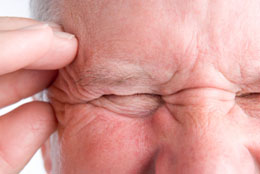Occipital Neuritis is a condition which results due to trauma to the occipital nerve at the back of the neck. This article will tell you about the symptoms, causes and treatment for this condition.

The term 'Occipital Neuritis' sounds a little complicated to understand, doesn't it? Well, in simple terms, occipital neuritis is another word for the sharp pain that you experience at the back of your neck. It is also known as
post traumatic neck syndrome. The pain usually results from the damage of the occipital nerve which is located on both the sides of the base of the skull or the tip of the neck. This muscle is one of the main muscles of this region and is responsible for the muscular strength and sensation present in the neck and scalp at the back. The occipital muscle arises from within the spinal column and may cause discomfort when traumatized due to physical or emotional stress. This can lead to severe pain in the back of the neck, head and may also radiate to the eyes and front of the head. This condition is known to affect almost everyone at some point or the other at any age.
Symptoms of Occipital Neuritis
Pain is the most commonly associated symptom with this condition. The severity of the pain may vary depending upon the cause. The pain is also accompanied by tenderness in the neck and the back of the scalp, spasms in the neck, dizziness and so on. Have a look at the most commonly observed symptoms of this condition.
- Pain (usually sharp and stabbing in nature) at one side of the head
- Spasms in the neck
- Dizziness
- Blurred vision
- Tenderness in the neck
- Pain between the shoulder blades
- Fatigue
- Headache
- Ear ache
- Pain in the shoulders
- Sore spot at the back of the head
- Pain or pressure in the eyes
Causes of Occipital Neuritis
As mentioned earlier, the condition occurs because of the trauma or injury that takes place in the occipital nerve. This can take place due to a hit, injury or some form of whiplash in the neck. Mentioned below is a list of possible causes of this condition.
- Stress
- Infection
- Injury (could be in the cervical spine as well)
- Whiplash
- Syphilis is also known to be a factor triggering this condition
- Shingles
- Tightness of the neck muscles
- Driving/sitting for long periods of time
- Repetitive usage of phone can also be a cause
- Aging can also lead to this condition
Treatment for Occipital Neuritis
The treatment options would actually depend upon the underlying cause of the condition. If it is due to muscle stiffness, then the treatment would be different to that of an occipital neuritis due to shingles. Therefore, if you can identify yourself with the aforementioned symptoms and signs, or even causes perhaps, then you must get yourself checked by a healthcare specialist and get the root cause checked. Mentioned below are the most commonly used treatment methods to cure the condition. Have a look!
- Injections to relieve the pain
- Heat-cold compressions
- Pain killers
- Non-Steroidal Anti-Inflammatory Drugs
- Rest to relax the muscles
- Massage therapy
- Surgery
I hope this article helped you understand the condition in a much better way and also that talking too much on the phone, sitting and driving for long hours is not good for your body. Always try to keep a balance in whatever you do and do not strain yourself so much! After all, health is more important than everything else in the world, right? So the next time you experience pain in the back of the head and neck, make sure you don't avoid it but visit a trusted healthcare specialist as soon as possible. Take care and have a safe tomorrow.


 The term 'Occipital Neuritis' sounds a little complicated to understand, doesn't it? Well, in simple terms, occipital neuritis is another word for the sharp pain that you experience at the back of your neck. It is also known as post traumatic neck syndrome. The pain usually results from the damage of the occipital nerve which is located on both the sides of the base of the skull or the tip of the neck. This muscle is one of the main muscles of this region and is responsible for the muscular strength and sensation present in the neck and scalp at the back. The occipital muscle arises from within the spinal column and may cause discomfort when traumatized due to physical or emotional stress. This can lead to severe pain in the back of the neck, head and may also radiate to the eyes and front of the head. This condition is known to affect almost everyone at some point or the other at any age.
The term 'Occipital Neuritis' sounds a little complicated to understand, doesn't it? Well, in simple terms, occipital neuritis is another word for the sharp pain that you experience at the back of your neck. It is also known as post traumatic neck syndrome. The pain usually results from the damage of the occipital nerve which is located on both the sides of the base of the skull or the tip of the neck. This muscle is one of the main muscles of this region and is responsible for the muscular strength and sensation present in the neck and scalp at the back. The occipital muscle arises from within the spinal column and may cause discomfort when traumatized due to physical or emotional stress. This can lead to severe pain in the back of the neck, head and may also radiate to the eyes and front of the head. This condition is known to affect almost everyone at some point or the other at any age.